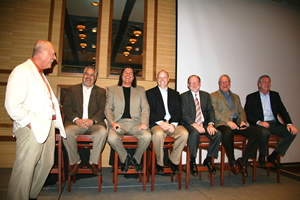URG, the United Recyclers Group, hosted a Body Shop Panel Discussion at its 2011 annual conference in Englewood, Colo., on April 15. The two-day event was attended by more than 800 recyclers.
Facilitator Don Porter of State Farm opened up the discussion by asking panelists to introduce themselves and talk a little about their businesses. Porter also addressed the audience and lightheartedly requested that they be civil.
“You don’t have to be nice to me – just be nice to these people,” Porter said.
The panelists included:
• Gary Boesel, owner of two CARSTAR collision repair centers in the Denver area. In 2010, Boesel was selected as Small Business Person of the Year by the Aurora, Colo., Chamber of Commerce. He also sits on the CARSTAR National Advisory Board.
• Gary Wano, owner of G.W. and Son Auto Body in Oklahoma City, Okla. Family-owned for 25 years, the shop is certified to do repairs on Mercedes-Benz, Jaguar and Volvo vehicles. Wano is immediate past chair of the Society of Collision Repair Specialists (SCRS) and, in 2008, was the BodyShop Business Collision Repair Shop Executive of the Year.
• Dan Stander, general manager of Fix Auto Highlands Ranch and Jerry Stander’s Collision, a family-owned business for more than 30 years. Stander is the Automotive Service Association National Collision Division Director.
• Bob Jones, owner-operator of RJones Body Pros, a business he founded in Des Moines, Iowa in 1971. Jones is a founding member and past chairman of SCRS and has been inducted into the Collision Industry Conference (CIC) “Hall of Eagles.”
• Clark Plucinski, executive vice president of sales and marketing of True2Form, which recently became part of the Boyd Group/Gerber Collision & Glass. Plucinski serves on numerous industry boards, is an inductee into the CIC Hall of Eagles and was voted BodyShop Business Collision Repair Shop Executive of the Year in 1996.
• Tim Adelman, executive vice president of business development of ABRA Auto Body & Glass in Brooklyn Center, Minn. Adelman joined the ABRA organization as general manager of the second-ever ABRA collision center and now leads ABRA’s industry relations department and serves on numerous industry advisory boards.
“We’ve grown together from mom and pop organizations to the large conglomerates we are today,” Clark Plucinski told the recyclers in the room. “We’re now all interconnected in business-to-business relationships.”
Gary Boesel agreed. “We’re in an evolution over the years of how different things are than they used to be.”
It was generally agreed upon that somewhere, somehow, collision repairers and recyclers quit effectively communicating during their evolution. But the crowd gathered seemed determined to bring that communication back.
Everyone on the panel shared almost the same story about the "condition" of the part and on-time delivery dates. In today’s collision repair market, shops are measured by how many alternative parts they use, cost effectiveness and, most importantly, cycle time. Cycle time was recognized by the panel as the most critical component in their business operations today. They agreed that if a part is delivered to a shop that expects an undamaged part, and it receives a part with undisclosed damage, there is significant cost to everybody involved.
“We work with our collision customers and train our staff, but when parts are found electronically and the price is the lowest common denominator, then the shop is going to get that cheapest part and they’re not going to accept it,” said Bill Abold, A&P Auto Recycling of Cicero, New York. "We then have to work through the price difference with the shop and the insurance company. That doesn’t work for anyone.”
To eliminate the "condition" problem, the Automotive Recycling Association, in concert with CIECA, has developed a standard set of damage codes to be used by repairers and recyclers. However, the panel made a surprising revelation: no one is using it and few people know about it. Repairers noted that condition codes on parts found through third-party locators had no meaning to them at all.
“Have a little patience with us, please," said Gary Wano. "Sometimes our concept of a useable part may be different than your sales staff’s – but we’re working on this.”
Adelman of ABRA shared these first quarter 2011 statistics from 100 ABRA locations. On a scale of 1 to 10, with 10 being the highest, the following scores were registered:
CSI
OEM: 9
Recyclers: 7.5
Overall quality of parts received
Recyclers: 7.4
Accuracy of part
Recyclers: 8.2
On-time delivery
Recyclers: 6.8
“We survey parts people for supplier improvement opportunities,” explained Adelman.
The panelists agreed that relationships with good quality recyclers is the most important criteria. They’re looking for a good product and are looking for it to be delivered on time.
“The goal at our shop is to spend less time on the phone and using e-mail,” said Dan Stander. “It’s more time effective, and we don’t have any confusion about descriptions.”
Plucinski asked that the industry recognize the processes.
“These are working, but it’s like pushing a rock uphill," he said. "We just have to be patient and keep doing the same thing.”
Bob Jones summed up the wants of both sides pretty clearly. "You guys want to sell us the correct part, and we want to buy the correct parts.”













